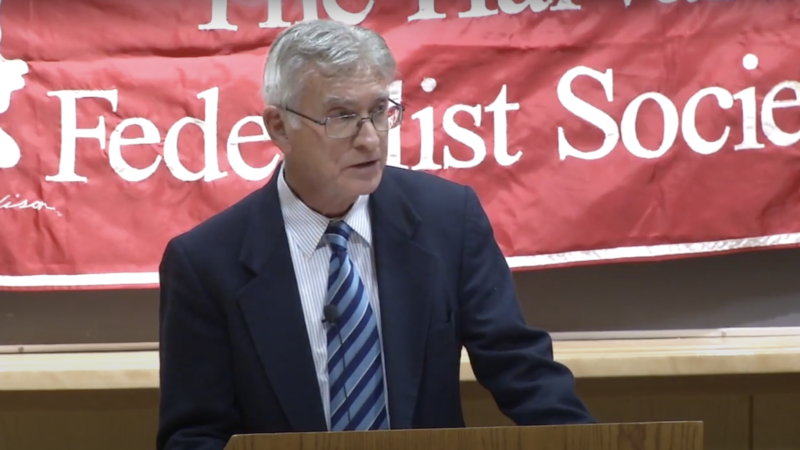Emory Law Journal Refuses To Publish Conservative Professor's Dismissal of Systemic Racism
"The editors found my views to be 'hurtful' and refused to publish them," says Lawrence Alexander.

Lawrence Alexander is a professor at the University of San Diego School of Law. He is known for having co-authored an infamous article in The Philadelphia Inquirer with University of Pennsylvania law professor Amy Wax arguing that the decline of "bourgeois values" in the U.S. was associated with various negative social developments. They wrote:
That culture laid out the script we all were supposed to follow: Get married before you have children and strive to stay married for their sake. Get the education you need for gainful employment, work hard, and avoid idleness. Go the extra mile for your employer or client. Be a patriot, ready to serve the country. Be neighborly, civic-minded, and charitable. Avoid coarse language in public. Be respectful of authority. Eschew substance abuse and crime.
These basic cultural precepts reigned from the late 1940s to the mid-1960s. They could be followed by people of all backgrounds and abilities, especially when backed up by almost universal endorsement. Adherence was a major contributor to the productivity, educational gains, and social coherence of that period.
That essay proved to be deeply controversial, and was followed by several more controversies involving Wax. She was recently accused of racism after stating that Asian immigration should be curtailed, largely on the grounds that most Asian immigrants vote for Democrats. Her university has already taken steps to prevent her from teaching her class, which is a blow to basic principles of academic freedom, no matter how wrong those views may be.
Now Alexander is facing an even more obvious violation of basic principles of academic freedom; he was recently asked by the Emory Law Journal—a publication of Emory University's law school—to contribute to a "festschrift" on the works of Michael Perry, an Emory law professor. A festschrift is a collection of writings intended to honor a particular scholar, even if they critique elements of that scholar's thinking.
Alexander's contribution was indeed critical of Perry's work on disparate racial impact and equal protection. "I focus on it, not to find a bone to pick somewhere in Michael's
impressive body of work, but because his error in that early work has an analogue in today's political discourse, which makes that error of many years past of contemporary importance," wrote Alexander.
He writes from a conservative perspective, and undoubtedly takes a view that the presumably liberal editors of the Emory Law Journal disagree with. But they did not merely register that disagreement and proceed with publication: They told Alexander the essay was racist and would have to be substantially revised.
"We take issue with your conversation on systemic racism, finding your words hurtful and unnecessarily divisive," wrote Danielle Kerker Goldstein, the editor in chief. "Additionally, there are various instances of insensitive language use throughout the essay (e.g., widespread use of the objectifying term 'blacks' and 'the blacks' (pages 2, 3, 6, 8, etc.); the discussions on criminality and heredity (pages 11 and 14), the uncited statement that thankfully racism is not an issue today (page 18)). And, crucially, the discussion on racism is not strongly connected to your commentary on Professor Perry's work, which is the focus of the Issue and the purpose behind the publication opportunity offered."
Kerker Goldstein did not respond to a request for comment.
Readers can take a look at the essay and judge for themselves. Speaking only for myself, I have a hard time agreeing that the language is insensitive and objectifying. Alexander does indeed refer to "black" and "blacks," but he also refers to "white" and "whites." He invokes criminality and heredity merely to set the matter aside entirely. And his views on whether racism is an important issue today are certainly relevant to his rejection of Perry's philosophy.
Alexander refused to modify the piece. "I wrote about how I see the racial situation in the U.S. today," he tells Reason. "The editors found my views to be 'hurtful' and refused to publish them, despite the fact that I had been invited to write for a festschrift issue in their journal."
Two other contributors have withdrawn their submissions in protest of how the journal treated Alexander. The point of the festschrift is to include a range of perspectives on Perry; singling out Alexander's undermines the validity of the project.
"This opera isn't over," wrote Gail Heriot, a professor of law at the University of San Diego Law School and a contributor to the Volokh Conspiracy, which is hosted on this website. "Two law professors (one conservative and one liberal) have withdrawn their essays from the ELJ in protest over its treatment of Larry. Two more professors, both of whom I believe to be left of center, have said that they will publish only if they can include a blurb in front of their essays that protests the decision not to publish Larry. They do not necessarily agree with everything in Larry's essay. But standing up for him doesn't require agreement."
Read Heriot's article here.
